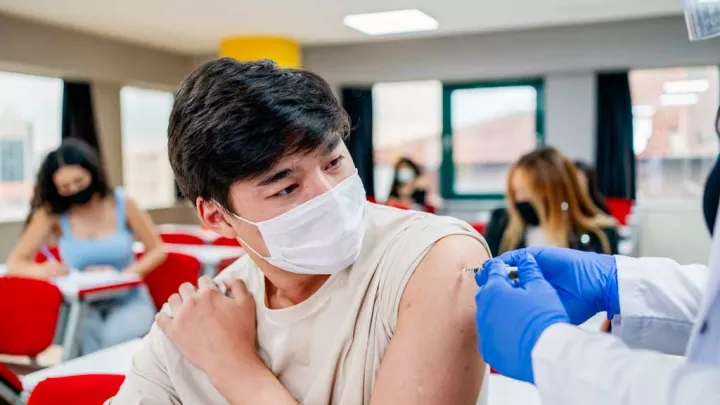Cardiac MRI
Magnetic resonance imaging (MRI) uses a magnetic field, radio waves, and advanced computer technology to create detailed 3D images of internal organs and structures. A cardiac MRI, or heart MRI, provides highly detailed images of the heart and its surrounding anatomy, enabling doctors to diagnose and monitor heart conditions with precision.
At Children’s Hospital Los Angeles, these advanced diagnostic tests are conducted in our state-of-the-art Cardiac Imaging Suite, staffed by a team of specially trained pediatric imaging experts dedicated to delivering exceptional care.
Advanced MRI Technology at CHLA
At CHLA, we are dedicated to bringing the latest advancements in imaging technology to our pediatric patients. Our Cardiac Imaging Suite is equipped with two state-of-the-art MRI systems: a Siemens Sola 1.5 Tesla MRI machine and a revolutionary low-field, high-resolution Siemens FreeMax 0.55T Tesla MRI system. CHLA is proud to be the first pediatric hospital in the United States to feature this FDA-approved, high-performance low-field magnet.
Our suite also offers specialized stress testing for myocardial perfusion, addressing blood flow issues in the heart. CHLA is the only facility in California providing this advanced diagnostic service, setting a new standard for pediatric cardiac imaging.
Siemens Sola 1.5 Tesla MRI Machine
The Sola machine is the current standard for advanced cardiac MRI and delivers exceptional image clarity, providing our pediatric cardiologists with highly detailed views of the heart and surrounding structures. This advanced system ensures:
- High-Resolution Imaging: Unparalleled diagnostic accuracy for even the most complex heart conditions.
- Faster Scan Times: Reduced procedure time for a more comfortable experience, especially for young patients.
- Versatility Across Clinical Needs: Tailored imaging capabilities for everything from intricate heart defects to routine follow-up evaluations.
Siemens FreeMax 0.55 Tesla MRI Machine
The FreeMax low-field, high-resolution MRI machine is a groundbreaking innovation in pediatric imaging, designed with the needs of younger and more sensitive patients in mind. CHLA is honored to be the first pediatric hospital in the United States to feature this FDA-approved, high-performance low-field magnet. This system offers numerous benefits, including:
- Enhanced Safety for Patients with Implants: Ideal for children with pacemakers or other metal implants, overcoming limitations of traditional MRI technology.
- Reduced Contrast Dye Requirements: Minimizing the use of contrast dye to lower the risk of side effects.
- Child-Friendly Experience: Faster imaging with less noise for a more comfortable and stress-free procedure.
- Increased Comfort: Provides additional space, making the experience more accommodating for patients who may feel confined.
- Ability to Image Air-Containing Organs: The FreeMax offers exceptional images of lungs, airways, and intestines that are not well seen on stronger MRI machines.
This technology reflects CHLA’s commitment to integrating cutting-edge advancements with compassionate care, ensuring every child has access to the best diagnostic tools available.
Cardiac MRI Scan Uses
Heart MRIs help doctors diagnose and monitor heart conditions, plan for surgery and evaluate the results of surgery. They are particularly useful for diagnosing heart muscle diseases and conditions.
Cardiac MRI scans show:
- Heart and blood vessel anatomy and function
- Blood flow through the heart and major blood vessels
- Heart muscle diseases
- Heart valve disorders
- Structural heart or blood vessel defects
- Tissue damage from a heart attack or virus (myocarditis)
- Heart tumors
What to Expect During a Cardiac MRI Scan
Cardiac MRIs are noninvasive, painless, and safe procedures designed to provide detailed images of the heart and surrounding structures. Your child’s scan will take place in our dedicated Cardiac Imaging Suite, where our advanced MRI machines are located. Most MRI machines include a table that gently slides into a large metal tube for imaging.
For many children, MRI scans can be completed without general anesthesia. However, younger children, typically between 6 months and 6-years-old, may require anesthesia to remain still for the duration of the scan. The need for anesthesia depends on your child’s specific circumstances and the imaging required. The decision will be made collaboratively by your child’s doctor, the anesthesiology team, and you. The Cardiac Imaging Suite is dedicated to using the least amount of sedation as possible and is developing motion-insensitive imaging methods to improve imaging of wiggly children.
For children as young as 4 or 5-years-old, video goggles can often be used as an alternative to anesthesia. Watching a movie through the goggles helps distract them and minimizes any sense of being in an enclosed space, making the experience more comfortable and stress-free.
Preparing for a cardiac MRI
It’s important to remove any objects that may contain metal from your child before an MRI scan. Make sure to remove items such as:
- Clothes with metal zippers or buttons
- Glasses
- Hair pins
- Hearing aides
- Jewelry or watches
- Metal retainers
- Underwire bras
Cardiac MRI process
During a cardiac MRI:
- The MRI technologist often places electrocardiogram (EKG) electrodes (small tabs) on your child to synchronize the images with your child’s heartbeat. Some children may have other monitors to track things like breathing and pulse during the scan.
- If the doctor orders a cardiac MRI with contrast, a nurse gives your child an intravenous line (IV) before the scan. After taking some images without contrast, the technologist injects the contrast dye into the IV and takes more images.
- When it’s time for the scan, your child lies down on the table. It’s important for your child to lie still during the scan to capture a clear image. Young children or children who cannot keep still may receive anesthesia to put them to sleep during the test. With video goggles, anesthesia is often not needed in children as young as 4 or 5 years of age because they can watch a movie that is started before they are moved into the scanner, taking away the feeling of an enclosed space.
- The technologist returns to the monitoring booth to perform the test. Children who are awake during the test can communicate with the technologist through a speaker in the machine.
- The MRI machine makes loud thumping noises during the scan. Children may receive earplugs or headphones to listen to music or watch a movie to help make the test more comfortable.
- Cardiac MRI scans take images in multiple sequences. Each sequence may last up to several minutes. A full cardiac MRI scan takes 30 to 90 minutes.
- For younger children who are being studied awake or with mild sedation, it is often helpful for a parent to remain in the scanner room to touch the child’s foot and offer encouragement between image acquisitions. Ear protection will be provided to the parent, as well as the child.
Cardiac MRI Risks
Cardiac MRI scans do not use radiation or iodine-containing contrast dyes like some other imaging tests do. As a result, cardiac MRIs are safe, and your child is not exposed to any radiation. For MRIs with contrast, there is a small chance of allergic reaction to the dye (around 1 in 1,000 cases). But if they occur, reactions are typically mild and may result in nausea or vomiting. The radiology department is prepared to treat allergic reactions if they happen.
Ask your doctor if a cardiac MRI is safe if your child:
- Has a pacemaker
- Has a stent, artificial heart valve, or vascular coil (these are safe but disrupt the images)
- Has any kind of metal implant (most are certified safe for MRI)
- Has a stent or artificial heart valve
- Has kidney problems
- Has had a prior reaction to either MRI or CT contrast
- Has tattoos
- May be pregnant
Cardiology Care at Children’s Hospital Los Angeles
At CHLA, your child receives excellent care from world-class experts. We’re ranked among the nation’s best pediatric cardiac and heart surgery programs by U.S. News & World Report and house the largest congenital heart program on the West Coast. Learn more about our pediatric heart programs and services.


